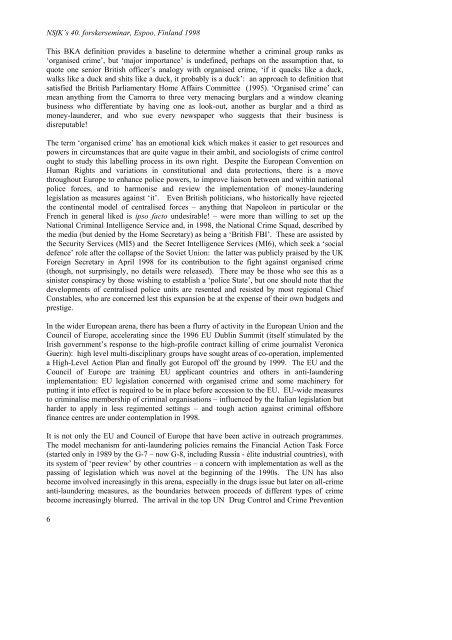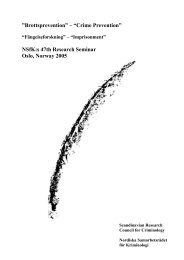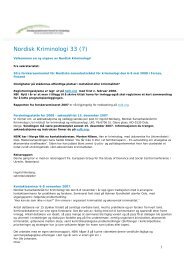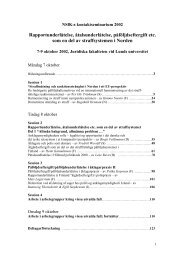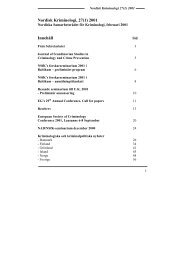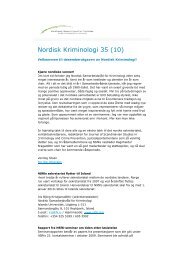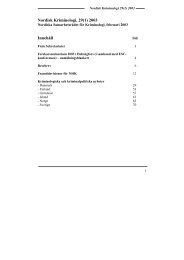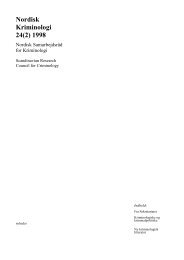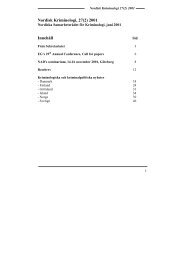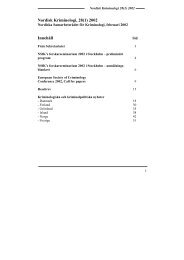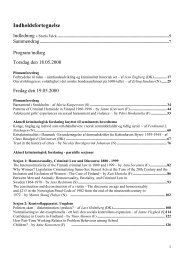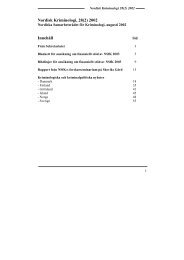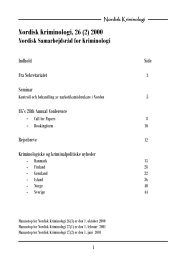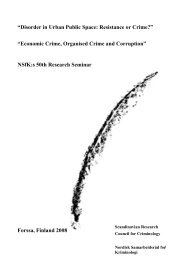Organised Crime & Crime Prevention - what works? - Scandinavian ...
Organised Crime & Crime Prevention - what works? - Scandinavian ...
Organised Crime & Crime Prevention - what works? - Scandinavian ...
You also want an ePaper? Increase the reach of your titles
YUMPU automatically turns print PDFs into web optimized ePapers that Google loves.
NSfK’s 40. forskerseminar, Espoo, Finland 1998<br />
This BKA definition provides a baseline to determine whether a criminal group ranks as<br />
‘organised crime’, but ‘major importance’ is undefined, perhaps on the assumption that, to<br />
quote one senior British officer’s analogy with organised crime, ‘if it quacks like a duck,<br />
walks like a duck and shits like a duck, it probably is a duck’: an approach to definition that<br />
satisfied the British Parliamentary Home Affairs Committee (1995). ‘<strong>Organised</strong> crime’ can<br />
mean anything from the Camorra to three very menacing burglars and a window cleaning<br />
business who differentiate by having one as look-out, another as burglar and a third as<br />
money-launderer, and who sue every newspaper who suggests that their business is<br />
disreputable!<br />
The term ‘organised crime’ has an emotional kick which makes it easier to get resources and<br />
powers in circumstances that are quite vague in their ambit, and sociologists of crime control<br />
ought to study this labelling process in its own right. Despite the European Convention on<br />
Human Rights and variations in constitutional and data protections, there is a move<br />
throughout Europe to enhance police powers, to improve liaison between and within national<br />
police forces, and to harmonise and review the implementation of money-laundering<br />
legislation as measures against ‘it’. Even British politicians, who historically have rejected<br />
the continental model of centralised forces – anything that Napoleon in particular or the<br />
French in general liked is ipso facto undesirable! – were more than willing to set up the<br />
National Criminal Intelligence Service and, in 1998, the National <strong>Crime</strong> Squad, described by<br />
the media (but denied by the Home Secretary) as being a ‘British FBI’. These are assisted by<br />
the Security Services (MI5) and the Secret Intelligence Services (MI6), which seek a ‘social<br />
defence’ role after the collapse of the Soviet Union: the latter was publicly praised by the UK<br />
Foreign Secretary in April 1998 for its contribution to the fight against organised crime<br />
(though, not surprisingly, no details were released). There may be those who see this as a<br />
sinister conspiracy by those wishing to establish a ‘police State’, but one should note that the<br />
developments of centralised police units are resented and resisted by most regional Chief<br />
Constables, who are concerned lest this expansion be at the expense of their own budgets and<br />
prestige.<br />
In the wider European arena, there has been a flurry of activity in the European Union and the<br />
Council of Europe, accelerating since the 1996 EU Dublin Summit (itself stimulated by the<br />
Irish government’s response to the high-profile contract killing of crime journalist Veronica<br />
Guerin): high level multi-disciplinary groups have sought areas of co-operation, implemented<br />
a High-Level Action Plan and finally got Europol off the ground by 1999. The EU and the<br />
Council of Europe are training EU applicant countries and others in anti-laundering<br />
implementation: EU legislation concerned with organised crime and some machinery for<br />
putting it into effect is required to be in place before accession to the EU. EU-wide measures<br />
to criminalise membership of criminal organisations – influenced by the Italian legislation but<br />
harder to apply in less regimented settings – and tough action against criminal offshore<br />
finance centres are under contemplation in 1998.<br />
It is not only the EU and Council of Europe that have been active in outreach programmes.<br />
The model mechanism for anti-laundering policies remains the Financial Action Task Force<br />
(started only in 1989 by the G-7 – now G-8, including Russia - élite industrial countries), with<br />
its system of ‘peer review’ by other countries – a concern with implementation as well as the<br />
passing of legislation which was novel at the beginning of the 1990s. The UN has also<br />
become involved increasingly in this arena, especially in the drugs issue but later on all-crime<br />
anti-laundering measures, as the boundaries between proceeds of different types of crime<br />
become increasingly blurred. The arrival in the top UN Drug Control and <strong>Crime</strong> <strong>Prevention</strong><br />
6


